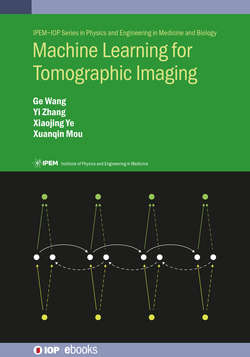Читать книгу Machine Learning for Tomographic Imaging - Professor Ge Wang - Страница 26
На сайте Литреса книга снята с продажи.
References
ОглавлениеAtick J J and Redlich A N 1992 What does the retina know about natural scenes? Neural Comput. 4 196–210
Bakushinsky A B and Kokurin M Y 2004 Iterative Methods for Approximate Solution of Inverse Problems (Berlin: Springer)
Baraniuk R G 2007 Compressive sensing IEEE Signal Process. Mag. 24 118–21
Bell A J and Sejnowski T J 1997 The ‘independent components’ of natural scenes are edge filters Vis. Res. 37 3327–38
Bertero M and Boccacci P 1998 Introduction to Inverse Problems in Imaging (Boca Raton, FL: CRC Press)
Cadieu C, Kouh M, Pasupathy A, Connor C E, Riesenhuber M and Poggio T 2007 A model of V4 shape selectivity and invariance J. Neurophysiol. 98 1733–50
Poggio T 2007 A model of V4 shape selectivity and invariance J. Neurophysiol. 98 1733–50
Chechile R A 2005 Independent component analysis: a tutorial introduction J. Math. Psychol. 49 426
Dashti M and Stuart A M 2017 The Bayesian Approach to Inverse Problems (Berlin: Springer)
Hyvärinen A, Hurri J and Hoyer P O 2009 Natural Image Statistics (London: Springer)
Landweber L 1951 An iteration formula for Fredholm integral equations of the first kind Am. J. Math 73 615–24
Leigh P N, Simmons A, Williams S, Williams V, Turner M and Brooks D 2002 Imaging: MRS/MRI/PET/SPECT: summary Amyotro. Later. Sclero. Other Motor Neur. Disord. 3 S75–80
Olshausen B A and Field D J 1996 Emergence of simple-cell receptive field properties by learning a sparse code for natural images Nature 381 607–9
Olshausen B A and Field D J 1997 Sparse coding with an overcomplete basis set: a strategy employed by V1? Vis. Res. 37 3311–25
Ringach D L 2002 Spatial structure and symmetry of simple-cell receptive fields in macaque primary visual cortex J. Neurophysiol. 88 455
Stuart A M 2011 Bayesian approach to inverse problems LMS-EPSRC Short Course (University of Oxford) 3–8 April
Zeng G L 2009 Medical Image Reconstruction (Berlin: Springer)
